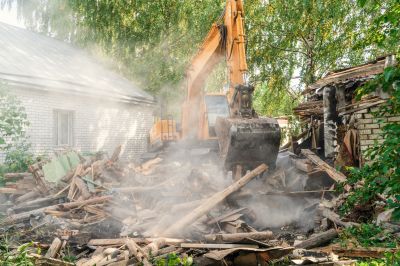Ultimate Selection of Demolition Tools for Maximum Productivity
Choose from a curated list of powerful and durable tools built to handle demanding demolition jobs.
 Demolition projects in Camarillo, CA, require a diverse array of tools and equipment to ensure efficiency and safety. From small-scale interior demolitions to large structural tear-downs, the right products can significantly influence the success of a project. Selecting appropriate demolition tools involves understanding the scope of work, material types, and safety considerations. Having access to reliable, durable equipment helps contractors and DIY enthusiasts alike to handle various demolition tasks effectively.
Demolition projects in Camarillo, CA, require a diverse array of tools and equipment to ensure efficiency and safety. From small-scale interior demolitions to large structural tear-downs, the right products can significantly influence the success of a project. Selecting appropriate demolition tools involves understanding the scope of work, material types, and safety considerations. Having access to reliable, durable equipment helps contractors and DIY enthusiasts alike to handle various demolition tasks effectively.
Top Overall Option
Heavy-Duty Demolition Hammer
A versatile heavy-duty demolition hammer combines power and durability, making it suitable for a wide range of tasks including breaking concrete, masonry, and other hard materials. Its robust construction and multiple chisel options allow for effective demolition work in various settings. When choosing a demolition hammer, consider weight, power source, and ergonomic features to ensure safe and efficient operation.
Types of Products For Demolition Service
Sledgehammers
Manual sledgehammers are essential for breaking up smaller structures and materials, offering straightforward power for controlled demolition tasks.
Jackhammers
Powered jackhammers are designed for breaking concrete and asphalt, providing high-impact force with various bit options.
Reciprocating Saws
Reciprocating saws are useful for cutting through wood, metal, and drywall, especially in tight spaces.
Demolition Blades
Specialized blades for saws enable precise cuts in concrete, brick, and other tough materials.
Concrete Crushers
Heavy-duty crushers are used to break down large concrete slabs into manageable pieces.
Wheelbarrows
Durable wheelbarrows facilitate the transportation of debris and rubble around the site.
Safety Gear
Personal protective equipment such as helmets, goggles, gloves, and respirators are vital for worker safety.
Dust Suppression Systems
Equipment designed to minimize dust during demolition activities helps maintain a cleaner work environment.
Hydraulic Breakers
Hydraulic-powered tools used for breaking large concrete structures and foundations.
Lifting Equipment
Cranes and hoists assist in removing heavy materials safely from demolition sites.
Scaffolding and Ladders
Support structures that provide access and safety for working at heights during demolition.
Air Compressors
Power sources for pneumatic tools used in demolition tasks.
Wire and Cable Cutters
Tools for safely cutting electrical wiring and cables during disassembly.
Vacuum Systems
Industrial vacuums to clean up dust and debris efficiently on-site.
Portable Generators
Provide reliable power to tools and equipment in locations without electrical access.
Material Handling Equipment
Forklifts and pallet jacks for moving heavy debris and materials around the site.
Water Blasters
High-pressure water jets used for surface preparation and cleaning after demolition.
Popular Choices
Corded or cordless saws designed for cutting through various building materials with ease.
Air-powered tools favored for their power and durability in heavy-duty demolition tasks.
Remote-controlled equipment capable of breaking down large concrete structures efficiently.
Versatile tools suitable for drilling and chipping in concrete and masonry work.
Protective handwear designed to withstand impact and abrasions during demolition.
Large containers for debris collection and removal from demolition sites.
Mobility solutions for water supply during dust suppression and surface cleaning.
Interchangeable chisel attachments for breaking up specific materials.
Remote operation enhances safety and precision in hazardous demolition areas.
Fall protection gear for working safely at elevated heights.
Lighting solutions to ensure adequate visibility during evening or indoor demolitions.
Compact waste containers for quick debris disposal on-site.
Used for surface preparation after demolition or for compacting backfill.
Assist in ventilation and dust control during demolition activities.
Tools for creating space or dismantling structures through hydraulic force.
Power sources for tools and lighting in remote or outdoor demolition sites.
Mark off hazardous areas to ensure site safety and compliance.
Proper planning and equipment selection are crucial for minimizing hazards and ensuring smooth operations. Safety gear, specialized tools, and machinery designed for demolition are essential components of any comprehensive toolkit. Whether breaking down walls, removing concrete, or dismantling fixtures, the right products facilitate a controlled and efficient process.
In addition to manual tools, powered equipment such as jackhammers and demolition saws play a vital role in handling tougher materials. Accessories like blades, bits, and attachments expand the versatility of these machines, allowing for more precise and varied applications. For demolition projects in Camarillo, knowing the available product options helps in making informed decisions tailored to specific project needs and site conditions.
Key Buying Considerations
- Assess the scope and scale of your demolition project to determine the necessary equipment and tools.
- Prioritize safety features and protective gear to ensure worker safety during demolition activities.
- Consider the power source of tools—corded, cordless, pneumatic, or hydraulic—based on site conditions.
- Evaluate the durability and build quality of equipment to withstand demanding demolition tasks.
- Look for ergonomic designs to reduce operator fatigue and enhance control during prolonged use.
- Check compatibility of blades, bits, and attachments with your existing tools or machinery.
- Factor in transportation and storage needs for larger equipment and debris handling gear.
- Review the availability of replacement parts and maintenance services for long-term reliability.
- Determine the noise levels of powered tools, especially if working in noise-sensitive environments.
- Consider dust suppression and cleanup options to maintain a cleaner and safer work site.
- Evaluate the versatility of multi-purpose tools that can handle various materials and tasks.
- Set a budget that balances quality and affordability, ensuring safety and efficiency are not compromised.
- Research local regulations and compliance requirements for demolition equipment and safety standards.
- Opt for lightweight and portable options when maneuverability is a priority in confined spaces.
- Check for user reviews and expert recommendations to gauge the performance and reliability of products.
